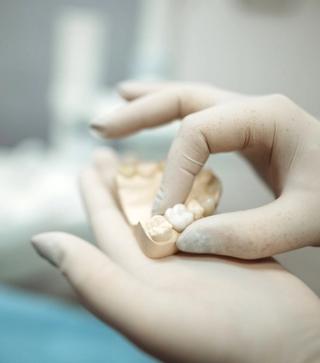
A dental crown is a thin, custom-made cover that snugly encases your existing tooth, adding strength, protecting your natural tooth, and enhancing its appearance.
At National Dental Care Browns Plains, we provide quality dental crown services tailored to your dental needs. Our friendly and experienced team are focused on helping you achieve your smile outcomes. If you are considering improving your smile, get in touch with our dental team in Browns Plains today.
What is a dental crown?
Dental crowns are a great solution for restoring teeth that are compromised or damaged, offering several advantages for your oral health. These crowns act as thin shells custom-designed to fit over your natural tooth, ensuring a seamless fit and a natural appearance.

Typically, a dental crown becomes necessary when a natural tooth has experienced weakening, breakage, or other forms of damage.
In addition to their functional benefits, dental crowns can also improve the appearance of teeth that are discoloured or misshapen. For instance, if a tooth has noticeable staining, a dental crown can be placed over the natural tooth, resulting in a brighter smile when traditional teeth whitening methods aren’t effective.
Dental crowns are usually made from porcelain, a durable material that can be colour-matched to your natural tooth shade. However, you can also choose gold crowns, which provide enhanced strength but don’t have the same natural appearance. Gold crowns are usually used for back teeth that are less visible but vital for chewing.
Advantages of a dental crown
A crown is an excellent solution to a number of problems, and offers a variety of advantages.

- Protect a weak or damaged tooth
The key advantage of a dental crown is that it strengthens your tooth, avoiding further damage or issues that could arise due to a weakened tooth. - Improved appearance
Dental crowns can cover misshapen or discoloured teeth for a brighter, whiter smile. - Long lasting
With the right care, a dental crown is a long-lasting solution that you can forget about after you get it.
How much does a crown cost?
The cost of a dental crown will vary depending on which tooth or teeth are involved and your private health insurance.
During your initial consultation at National Dental Care Browns Plains, our experienced dental professionals will evaluate your specific needs and provide you with a personalised treatment plan along with an accurate cost estimate.

Health Funds: At National Dental Care Browns Plains, we accept all major health fund providers. Plus, our HICAPS facilities allow you to claim your rebate on the spot after your treatment – there’s no waiting around.
We are also a preferred provider for many health funds - so if you’re with one of our preferred provider funds, it's likely you can use your dental extras and minimise out-of-pocket expenses. We're here to help you make the most of your dental benefits.
Payment Plans: Our payment plans, SmileFund and Afterpay, provide a flexible, interest-free payment option, ensuring you receive the care you need without worrying about the cost.
SmileFund is our exclusive payment plan that provides interest-free payments for unexpected or unplanned treatments for up to 18 months. If you use Afterpay, you can split your treatment cost into four equal, interest-free instalments over a few weeks.
What to expect from your dental crown appointment
Wondering what’s involved in a dental crown treatment? Here’s a step-by-step overview of the process:
- Preparation: Prior to your appointment, it's advisable to have a meal and drink to ensure your comfort.
- Oral Hygiene: Maintain excellent oral hygiene by brushing and flossing your teeth before the procedure.
- Anaesthesia: Your dentist will administer a local anaesthetic to numb the treated area, ensuring your comfort throughout.
- Tooth Preparation: A thin layer of your tooth will be carefully removed, shaping it to accommodate the dental crown.
- Impression: A precise mould of your prepared tooth will be taken to ensure an accurate fit for the crown.
- Temporary Crown: A temporary crown will be attached and adjusted to align with your bite for interim use.
- Discomfort: While the procedure may induce some discomfort, it should not be painful. You can raise your hand any time you need a short break.
- Numbness: Expect the area to remain numb for several hours following the procedure.
- Post-Procedure Tenderness: It's normal for the treated area to feel tender for a day or two after the procedure.
- Final Appointment: During the second appointment, your dentist will remove the temporary crown and evaluate the fit of the permanent crown.
- Permanent Crown Attachment: The permanent dental crown will be affixed using dental cement, and its shape will be refined to properly align with your bite.
Looking for a blend of aesthetics and functionality for your teeth?
Contact us to understand more about our reputable dental crown services at National Dental Care Browns Plains.
Frequently asked questions
Yes. A dental crown can greatly improve the strength, health, and appearance of your natural tooth. It’s a good solution for a number of issues, so be sure to discuss getting a crown with your dentist. They may be able to offer alternative solutions such as dental veneers, or explain why a crown is the best option for your needs.
No, getting a dental crown is not painful, as your dentist will give you a local anaesthetic to numb the area.
It may be uncomfortable to sit in the chair with your mouth open during treatment, but you can put your hand up for a break at any time. Also, our team of caring professionals will help to ensure your comfort throughout the entire process.
Crowns are usually suitable for teeth that have been heavily restored with previous fillings, or for teeth that have severe decay. The most common reason a crown fails is not the crown itself, but the tooth underneath.
If the crown does fail, you can often have it replaced. There is no set time to replace crowns - and with good oral hygiene and regular check-ups, a crown can typically last for many years.
Proper care, including regular brushing, flossing, and dental check-ups at National Dental Care Browns Plains, can help your dental crown to last as long as possible
Not all teeth that receive a dental crown require a root canal procedure. Root canal treatment is typically necessary when the tooth has extensive decay or infection that has reached the pulp, causing pain or abscess.
During your initial examination at National Dental Care Browns Plains, our experienced dentists will evaluate the condition of your tooth and recommend the best treatment, whether it involves a root canal or not.
Getting a dental crown is a common and highly safe procedure. The most typical side effect is tenderness around the treated area following the procedure, which will go away in a day or so and can be managed with over-the-counter pain medication in the meantime.
It is also possible to experience discomfort when the anaesthesia wears off. In this case, you will need to visit your dentist as soon as possible, as the crown may need to be better shaped to your tooth. This is not a common side effect but is something to be aware of.
Over time, there’s a chance your dental crown will chip, break or even come off. This is not common but can happen due to wear and tear, and can largely be avoided with good care. Should this occur, your dentist will either fix and reattach the crown or have a new one made.
